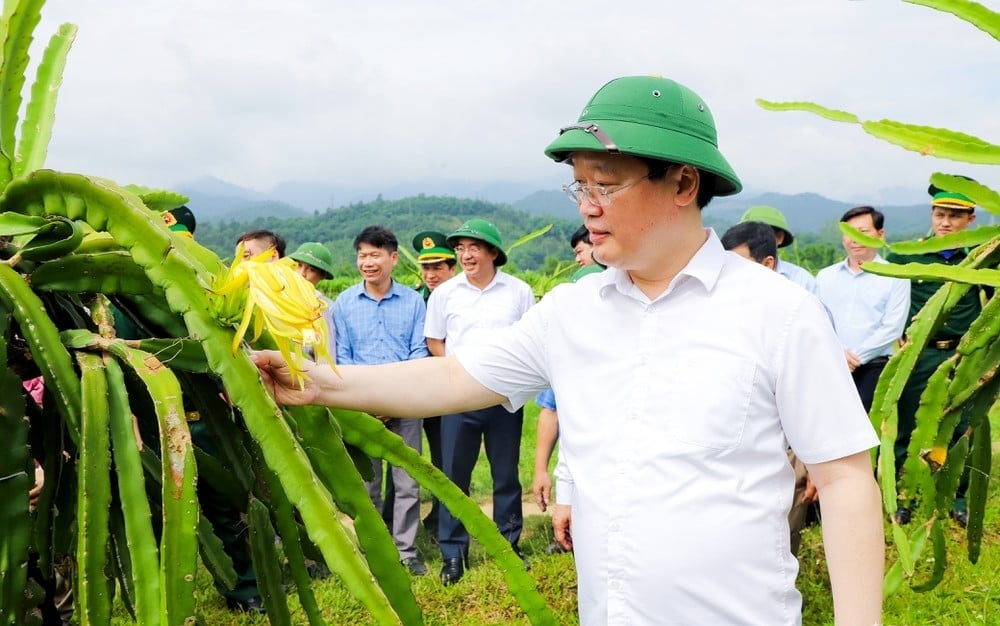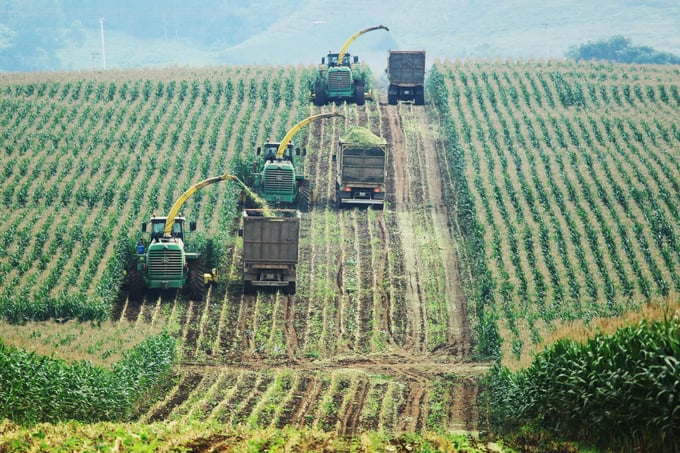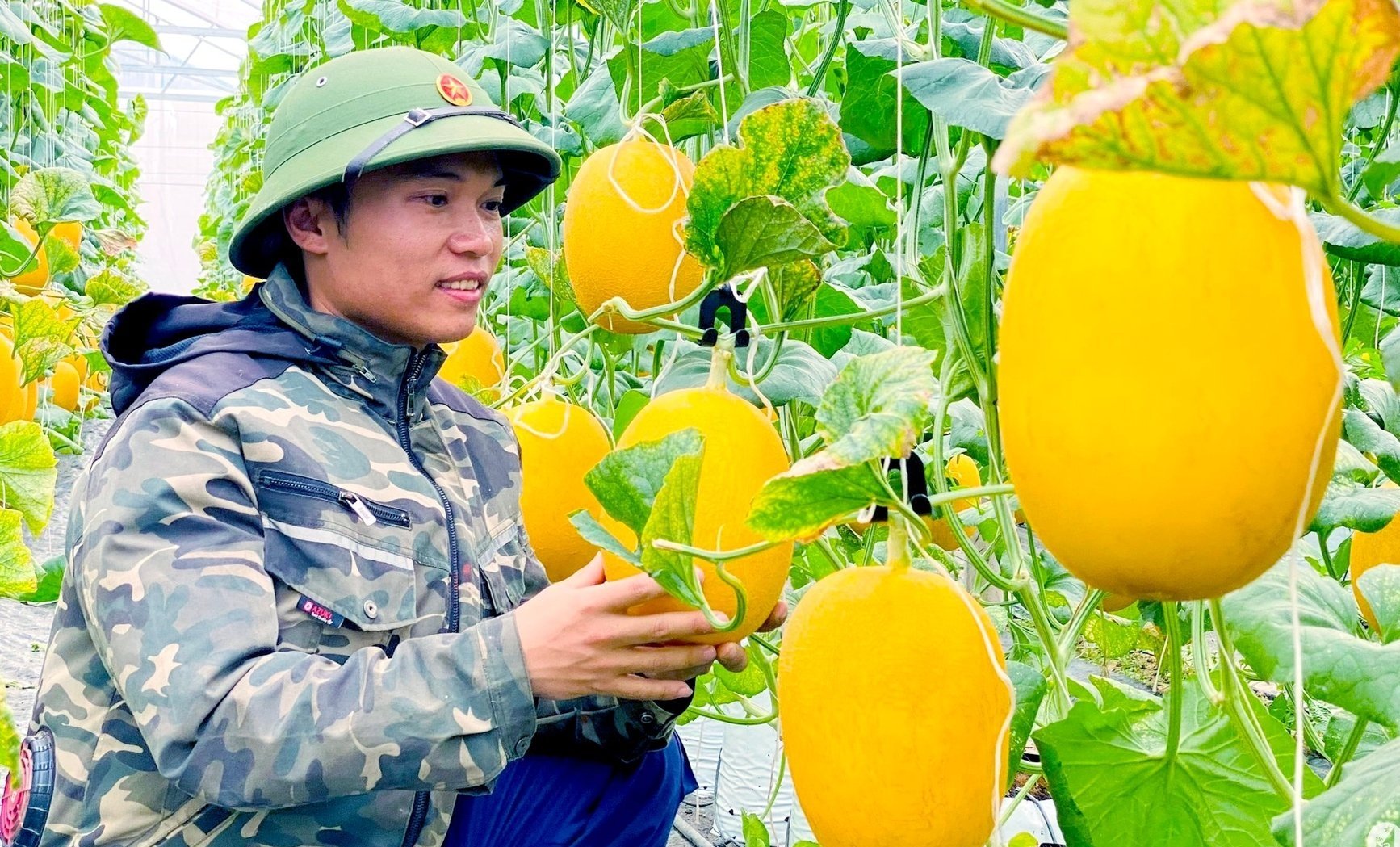December 4, 2025 | 12:17 GMT +7
December 4, 2025 | 12:17 GMT +7
Hotline: 0913.378.918
December 4, 2025 | 12:17 GMT +7
Hotline: 0913.378.918
In recent years, Nghe An Province in general, and the agriculture and environment sectors in particular, have faced immense challenges and pressures from the severe impacts of the Covid-19 pandemic, unpredictable weather patterns (notably Typhoon Yagi), and recently, the devastating Wipha storm in western Nghe An. In agricultural production, pest outbreaks have become increasingly complex, while the prices of production inputs continue to rise.

Mr. Nguyen Duc Trung, Secretary of the Nghe An Provincial Party Committee, visits a red-fleshed dragon fruit farming model in the former Tuong Duong District, Nghe An Province. Photo: Pham Bang.
However, thanks to the close adherence to the central government's directives and the proactive, flexible approach of the local authorities, the entire sector maintained an impressive growth rate, with all key targets being fundamentally met or exceeded. The internal economic structure has shifted in the right direction: within pure agriculture, the proportion of crop cultivation has gradually decreased while the proportion of livestock farming and services has increased.
According to a report by the Nghe An Department of Agriculture and Environment, the average growth rate of the province's agricultural, forestry, and fishery production value for the four-year period from 2021 to 2024 is estimated at 4.5%. Specifically, it reached 5.42% in 2021, 4.21% in 2022, 4.47% in 2023, and an estimated 4.15% in 2024. The projected growth for the entire 2021-2025 period is approximately 4.55%, completing the five-year plan's target (4.5% - 5%).
Mr. Nguyen Duc Trung, Secretary of the Nghe An Provincial Party Committee, affirmed: “In the past term, the agriculture and environment sectors have played a highly important role in the province’s development. With the growth rate achieved, these sectors have served as both a pillar and a safeguard of the economy, providing a solid foundation as well as a driving force for the province’s sustainable development.”
According to Mr. Trung, with 83% of Nghe An’s population living in rural areas, the positive results from the agriculture and environment sectors have helped maintain overall stability while gradually improving the cultural, material, and spiritual well-being of the people.

Mr. Nguyen Duc Trung emphasized that the agriculture and environment sectors provide both a solid foundation and a driving force for sustainable development. Photo: Viet Khanh.
In the past term, Nghe An’s internal sector structure also saw many positive shifts, moving from traditional to modern agriculture, with the share of livestock production increasing and crop cultivation declining. Nevertheless, the province has maintained its target of 1.1 million tons of total food output, contributing to national food security, meeting local consumption needs, ensuring adequate reserves, and supplying for export.
Secretary Nguyen Duc Trung highlighted that the agriculture and environment sectors achieved significant progress during 2021–2025, most notably in implementing the National Target Program on New Rural Development. Before the administrative unit reorganization, around 76% of communes in Nghe An had met the new rural standards, with more than 100 communes achieving advanced or model new rural status.
Provincial authorities have also given the environmental sector special attention through concrete measures and close guidance, particularly in decisively addressing various types of waste, especially urban solid waste, with a treatment rate exceeding 97%. Similarly, forest environmental management has been a priority, with forest coverage maintained at a stable 58%, ensuring forest protection and expansion to improve soil and water retention, thereby reducing the severity of natural disasters and floods.
Nghe An has emerged as a comprehensive growth hub of the North Central region, sustained by stable economic growth and an expanding economic scale. The province boasts a synchronously developed, modern, and interconnected infrastructure system - serving as a foundation for promoting both inter-regional and intra-regional economic linkages along shared economic corridors. Looking ahead, this forms a launchpad for the province to advance in step with the nation as it enters a new era of national rise.

Nghe An’s agriculture has been making a strong shift toward modernization. Photo: VK.
The new phase sets higher demands for resource management, environmental protection, climate change response, and the development of ecological agriculture and modern, civilized rural areas. Achieving these goals requires well-structured plans and roadmaps grounded in existing realities, with resources allocated at the right time and in the right priority areas.
“In the next term, Nghe An will implement economic development strategies and plans aimed at achieving high growth, with the target of double-digit increases as a springboard into a new era. For the agriculture and environment sectors, we see them as playing a leading role in driving the transition toward green growth and a circular economy. Building on practical realities, the province will continue shifting from traditional to modern, smart agriculture, thereby meeting the goal of increasing production value in the agricultural sector,” Mr. Nguyen Duc Trung stated.
“With the results achieved in the past term, we will prioritize shifting towards smart agriculture, ecological agriculture, and high-tech agriculture, while at the same time addressing bottlenecks and enhancing the environmental sector - identified as a key task in the province’s economic development for the 2025–2030 period,” emphasized Mr. Nguyen Duc Trung.
In the new phase, Nghe An will strive to bring more distinctive and competitive products into tightly linked value chains to increase producers' benefits. Agriculture and the environment will take the lead in applying science and technology, promoting digital transformation, developing the economy, and ensuring social welfare for rural communities while maintaining harmony with environmental factors.
Mr. Nguyen Duc Trung also highlighted the province’s potential and opportunities in implementing the One Commune One Product (OCOP) program. Over six years of implementation, with the engagement of the entire political system and the determination of stakeholders, Nghe An has made significant progress, proudly ranking second nationwide (after Hanoi) in the number of OCOP-certified products.
“We will focus on promoting and expanding OCOP products, with the goal not only to serve the domestic market but also to conquer international markets. This is also a sector in which Nghe An has great potential and advantages, and it will make an important contribution to the development of both the province and the country,” said Mr. Nguyen Duc Trung.
Translated by Phuong Linh
/2025/12/02/2629-3-141849_60.jpg)
(VAN) Based on its large-scale planted forests, several rubber enterprises have proactively conducted greenhouse gas emission inventories in preparation for entering the forest carbon credit market.

(VAN) MAE is leading in developing a national rare earth strategy, which will be submitted to the competent authorities for promulgation in early 2026.
/2025/12/02/4006-4-092040_652.jpg)
(VAN) The model of converting low-efficiency rice land to aquaculture in many localities has helped increase incomes by 5 to 15 times, improve the environment, and form new fisheries economic zones.

(VAN) Funded by ACIAR, Project FST/2020/123 focuses on measures to prevent harmful alien species, thereby protecting forests from invasive threats.

(VAN) The National Assembly's Supervisory Delegation pointed out solutions for the blue economy, circular economy, environmental protection, and technology application for sustainable marine governance.

(VAN) Lao Cai’s forestry sector is stepping into the spotlight with a series of pioneering initiatives in forest management, monitoring, and sustainable development aimed at generating carbon credits.

(VAN) The Provincial Competitiveness and Governance Index (PCGI) is a tool designed to reflect the quality of local governance.